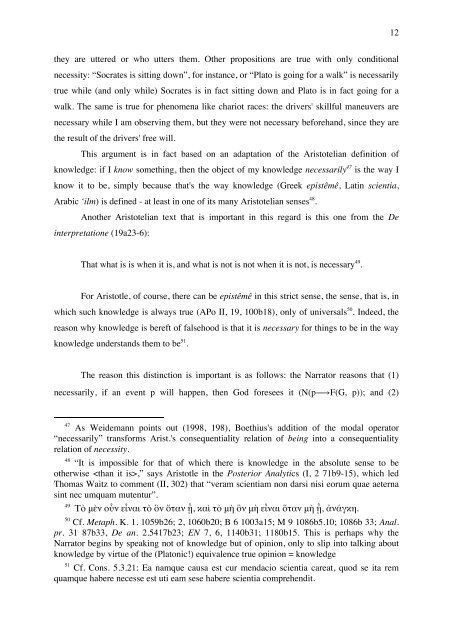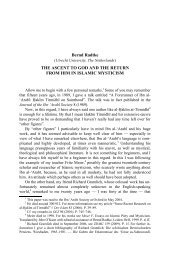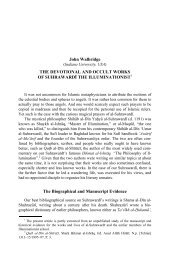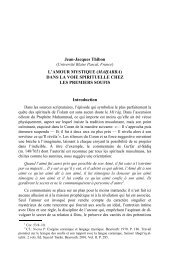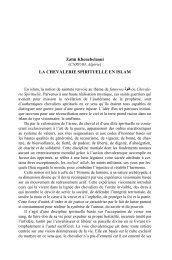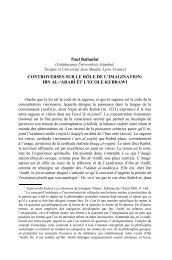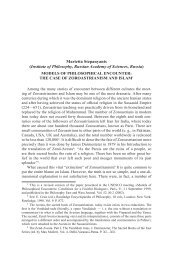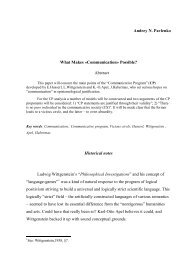Bothius talk DEF
Bothius talk DEF
Bothius talk DEF
You also want an ePaper? Increase the reach of your titles
YUMPU automatically turns print PDFs into web optimized ePapers that Google loves.
12<br />
they are uttered or who utters them. Other propositions are true with only conditional<br />
necessity: “Socrates is sitting down”, for instance, or “Plato is going for a walk” is necessarily<br />
true while (and only while) Socrates is in fact sitting down and Plato is in fact going for a<br />
walk. The same is true for phenomena like chariot races: the drivers' skillful maneuvers are<br />
necessary while I am observing them, but they were not necessary beforehand, since they are<br />
the result of the drivers' free will.<br />
This argument is in fact based on an adaptation of the Aristotelian definition of<br />
knowledge: if I know something, then the object of my knowledge necessarily 47 is the way I<br />
know it to be, simply because that's the way knowledge (Greek epistêmê, Latin scientia,<br />
Arabic ‘ilm) is defined - at least in one of its many Aristotelian senses 48 .<br />
Another Aristotelian text that is important in this regard is this one from the De<br />
interpretatione (19a23-6):<br />
That what is is when it is, and what is not is not when it is not, is necessary 49 .<br />
For Aristotle, of course, there can be epistêmê in this strict sense, the sense, that is, in<br />
which such knowledge is always true (APo II, 19, 100b18), only of universals 50 . Indeed, the<br />
reason why knowledge is bereft of falsehood is that it is necessary for things to be in the way<br />
knowledge understands them to be 51 .<br />
The reason this distinction is important is as follows: the Narrator reasons that (1)<br />
necessarily, if an event p will happen, then God foresees it (N(p⟶F(G, p)); and (2)<br />
47<br />
As Weidemann points out (1998, 198), Boethius's addition of the modal operator<br />
“necessarily” transforms Arist.'s consequentiality relation of being into a consequentiality<br />
relation of necessity.<br />
48 “It is impossible for that of which there is knowledge in the absolute sense to be<br />
otherwise ,” says Aristotle in the Posterior Analytics (I, 2 71b9-15), which led<br />
Thomas Waitz to comment (II, 302) that “veram scientiam non darsi nisi eorum quae aeterna<br />
sint nec umquam mutentur”.<br />
49 Τὸ μὲν οὖν εἶναι τὸ ὂν ὅταν ᾖ, καὶ τὸ μὴ ὂν μὴ εἶναι ὅταν μὴ ᾖ, ἀνάγκη.<br />
50 Cf. Metaph. K. 1. 1059b26; 2, 1060b20; B 6 1003a15; M 9 1086b5.10; 1086b 33; Anal.<br />
pr. 31 87b33, De an. 2.5417b23; EN 7, 6, 1140b31; 1180b15. This is perhaps why the<br />
Narrator begins by speaking not of knowledge but of opinion, only to slip into <strong>talk</strong>ing about<br />
knowledge by virtue of the (Platonic!) equivalence true opinion = knowledge<br />
51<br />
Cf. Cons. 5.3.21: Ea namque causa est cur mendacio scientia careat, quod se ita rem<br />
quamque habere necesse est uti eam sese habere scientia comprehendit.


